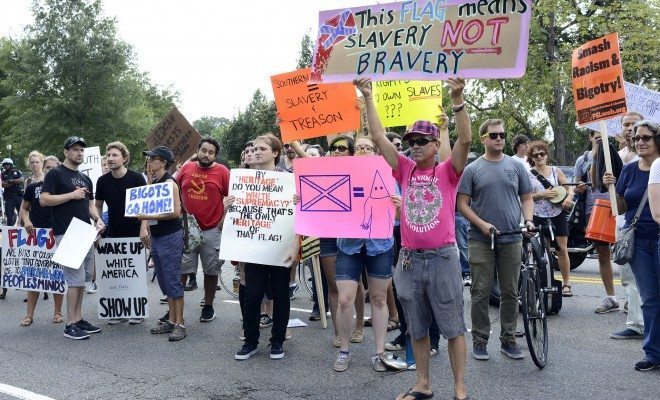 "2015 DC Means Don't Come Counter Protest 17" courtesy of [Stephen Melkisethian via Flickr]
"2015 DC Means Don't Come Counter Protest 17" courtesy of [Stephen Melkisethian via Flickr]
News
American Hate Groups Grew in 2015
The Southern Poverty Law Center (SPLC), a nonprofit legal advocacy group focused on fighting against hate groups and intolerance in American society, recently announced that there was a surge in hate groups in 2015, as well as a rise in “patriot” groups. The SPLC reported that there were 892 active hate groups in 2015, a 14 percent increase from the year before. These findings track well (and depressingly) with the contentious–and in some cases, hateful–rhetoric being consistently employed in the current 2016 primaries.
This reported rise actually comes after the number of hate groups has been steadily decreasing for some time, roughly the last decade or so. The SPLC warned that this growth in hate groups comes in part from the events of 2015–including several highly publicized terrorist attacks and the issues of national security, racism, and policing that have been front and center in the 2016 primary debates. The report stated:
The demonization of Muslims, Latinos, immigrants and others became commonplace in 2015. Presidential candidate Donald Trump made headlines with a call for a temporary ban on Muslim immigration and his description of Mexican immigrants as rapists and drug dealers. He even cited a bogus ‘poll’ by the Center for Security Policy that falsely claimed that a quarter of American Muslims support violent jihadists such as the members of the Islamic State.
There are a wide range of groups included on the list, from all sides of the political spectrum, including “neo-Nazis, white nationalists, neo-Confederates, racist skinheads, Klansmen and black separatists.”
SPLC releases new count of hate groups operating in America via @getgln https://t.co/pGkZ2dEZhE pic.twitter.com/3NcSTwImuE
— dorothy cook (@jcbme) February 18, 2016
There has also been more attention on “patriot” groups, which the SPLC reported are growing as well. Earlier this year, a “patriot” group took over a wildlife refugee in Oregon and conducted a roughly month-long standoff with federal authorities.
Check out fellow Law Streeter Mike Sliwinski’s explanation of the Oregon situation here.
While SPLC’s report is helpful, and certainly concerning, it is worth noting that it isn’t necessarily able to fully summarize the spread of hate in the United States. Many people are being radicalized online–a group to share or act on your views may not be necessary when there are chat rooms and blogs readily at your disposal. The SPLC recognizes that, however, pointing out to Dylann Roof as an example of someone who was radicalized without being part of a physical group. Heidi Beirich, the SPLC’s Intelligence Project Director has stated, “It could be that in 10 years a hate map, a hate list, doesn’t make any sense because people aren’t in groups anymore.”
But for now, the SPLC continues to track hate groups across the U.S.–and given the fact that they appear to be growing, it’s certainly a laudable undertaking.








Comments